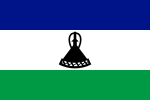Corruption in Lesotho has always been a problem since when it was a British protectorate during its early days.[1] However, the situation only became worse and more entrenched in the nation's political and economic systems around 1980s and 1990s. King Moshoeshoe II (1938-1996)[2] presided over an era of pervasive corruption and nepotism, with allegations of misappropriation of state funds and awarding government contracts to friends.[2][3] Nevertheless, by embracing multi-party democracy in the 1990’s, the nation managed to address some issues that existed before this time. Among those who are suspected of stealing money meant for developmental projects under Ntsu Mokhehle’s government (1993-1998), there were accusations of corruption related to his administration.[4] At the same time, Prime Minister Pakalitha Mosisili’s term (1998-2012) is also remembered due to various serious corrupt practices such as bribery regarding the Lesotho Highlands Water Project being a contentious issue. Under Prime Minister Thomas Thabane (2017-2020), corruption has remained one of Lesotho's biggest challenges; hence his regime faced many cases involving misuse of funds including looting COVID-19 relief money which appropriately reflects this nature.
Lesotho’s Directorate on Corruption and Economic Offences (DCEO), its anti-corruption agency, is grappling with lack of resources, political interference and corruption within the agency itself hampering effective investigation and prosecution of corruption cases. Lesotho’s corruption situation is worsened by ineffective institutions and refusal to fight corruption, limited transparency and accountability in government as well as public institutions, lack of whistle blower protection mechanisms and public participation, widespread nepotism and patronage, restricted access to information as well as press freedom. The measures aimed at fighting against corruption in Lesotho include creation of DCEO plus an Anti-Corruption Tribunal, implementation of legislation relevant to anti-corruption policies, international support from bodies like the UN and African Development Bank (ADB), civil society movements including sensitization campaigns.[1]
- ^ a b Machobane, L. B.; Karschay, Stephan (1990-08-06). Government and Change in Lesotho, 1800–1966: A Study of Political Institutions. Springer. ISBN 978-1-349-20906-4.
- ^ a b Waweru, Nduta (2019-01-15). "The complicated life of Lesotho's Moshoeshoe II who was dethroned and exiled twice by his people". Face2Face Africa. Retrieved 2024-06-17.
- ^ Jr, Donald G. McNeil (1996-01-16). "King of Tiny Land Circled by South Africa Dies in Car Plunge". The New York Times. ISSN 0362-4331. Retrieved 2024-06-17.
- ^ http://www.trc.org.ls/events/events19.981.htm#Lesotho%20Congress%20for%20Democracy%20Vacillates%20Before%20Electing%20New%20Leader

